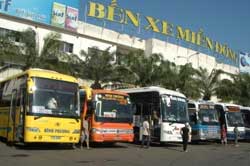VietNamNet Bridge – To cope with a severe shortage of parking lots, a total of 570 ha will be earmarked for developing bus stations, parking lots for buses, taxis and cars, goods-transit centres and customs clearance warehouses, according to the municipal Department of Transport.

Le Trung Tinh, head of the department's Transport Management Office, said that clearance and resettlement of affected households would not be time-consuming because many of the project sites are located on unoccupied or agricultural land in outlying districts.
He said that the department had submitted investment projects for development of approved land, including more than 60 ha set aside for bus stations and parking spaces for buses.
Investments in the form of Public-Private Partnership, including BOT (build, operate and transfer), will be directed toward parking lots for taxis and cars, goods-transit centres and customs clearance warehouses.
Phung Dang Hai, director of HCM City Transport Cooperative Union, said that sufficient parking space for buses would reduce the financial burden on cooperatives by cutting the costs of renting land and ensuring safety for drivers and vehicles when parking overnight.
Co-operatives said that parking space for buses in the city meets only 30 per cent of the demand, forcing many drivers to park on sidewalks or even on the streets. HCM City buses inadequate despite huge investment.
Despite huge investment, HCM City's bus fleet has failed to meet the targets set for last year in the City's public transport plans in which buses were expected to satisfy 35 per cent of local people's travel needs, authorities said.
Tinh said that last year buses had completed nearly 530 million passenger turns, satisfying only 6 per cent of local demand.
These figures were disappointing considering that since 2003, the city had spent VND3.7 trillion (US$184 million) on helping bus enterprises in upgrading vehicles, improving management and investing in bus stations and other facilities, he said.
Price subsidies for 2002 amounted to VND39 billion ($1.9 million), while last year's subsidy was a whopping 18 times higher, reaching over VND700 billion ($35 million), Tinh added.
Duong Hong Thanh, deputy head of the Transport Department, attributed the failure to poor bus network planning, traffic congestion, and poor quality service.
The city currently hosts 26 bus service companies, but most are small-scale businesses and lack financial capacity.
General Director of HCM City Alliance of Transport Co-operatives Phung Dang Hai said after three to four years or 240,000km of operation, buses required VND380 million ($18,900) worth of repairs.
However, most buses in the city were under continuous operation until they broke down, Hai said.
Last year, 108 buses were withdrawn from service due to their age, while the department had to raise bus ticket prices for 111 bus routes by VND1,000 to provide compensation to the companies.
Nguyen Ngoc Duong, deputy general director of the Phuong Trang Co Ltd, said that firms were hesitatant to invest in the sector because in the context of fluctuating fuel prices, profits were hard to earn.
Duong suggested that the Ministry of Transport should issue regulations for investing in bus services as well as rules relating to cost, price and fuel consumption to facilitate operations.
According to Tinh, to encourage companies to invest in the sector, the transport authorities should consider restrictions on individual vehicles, including bicycles and motorbikes and private cars in certain parts of the city.
VietNamNet/Viet Nam News